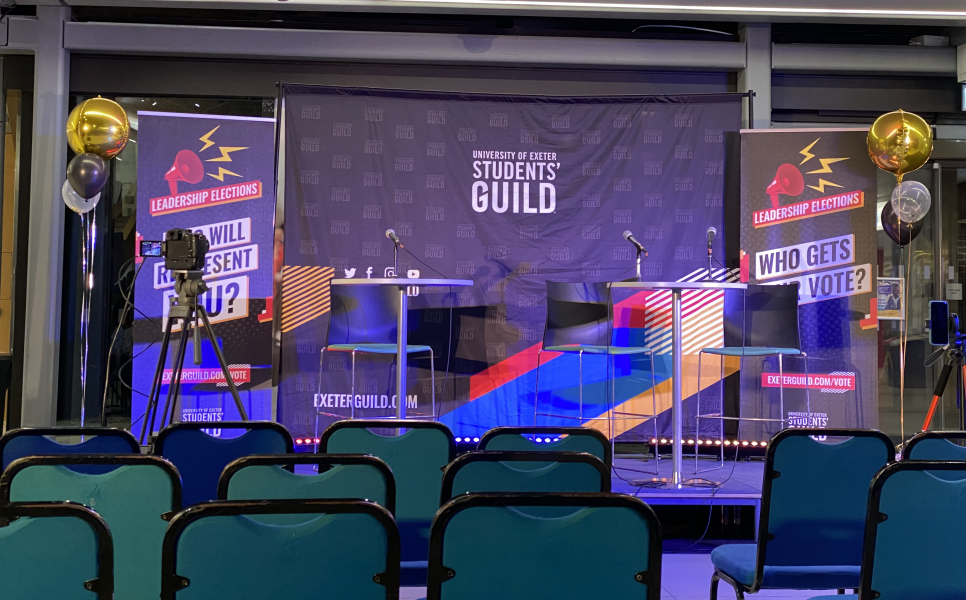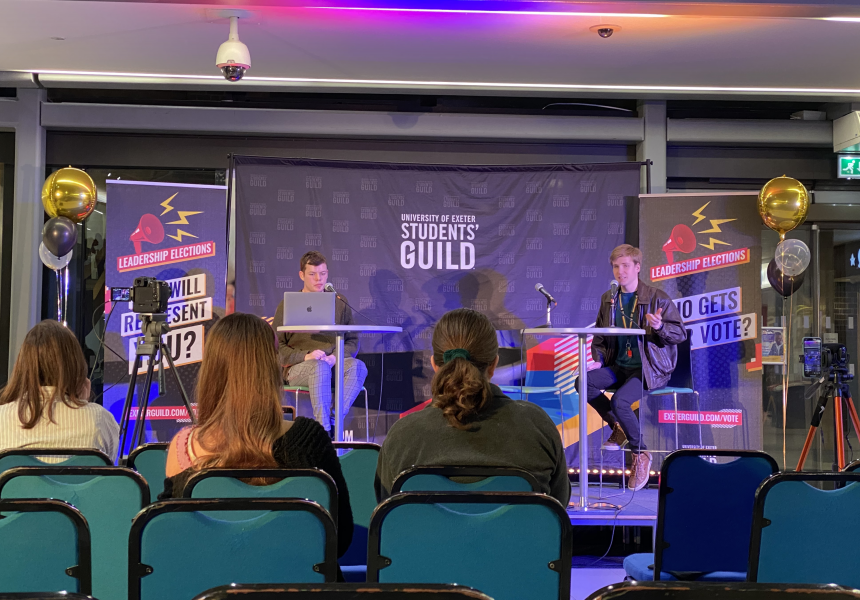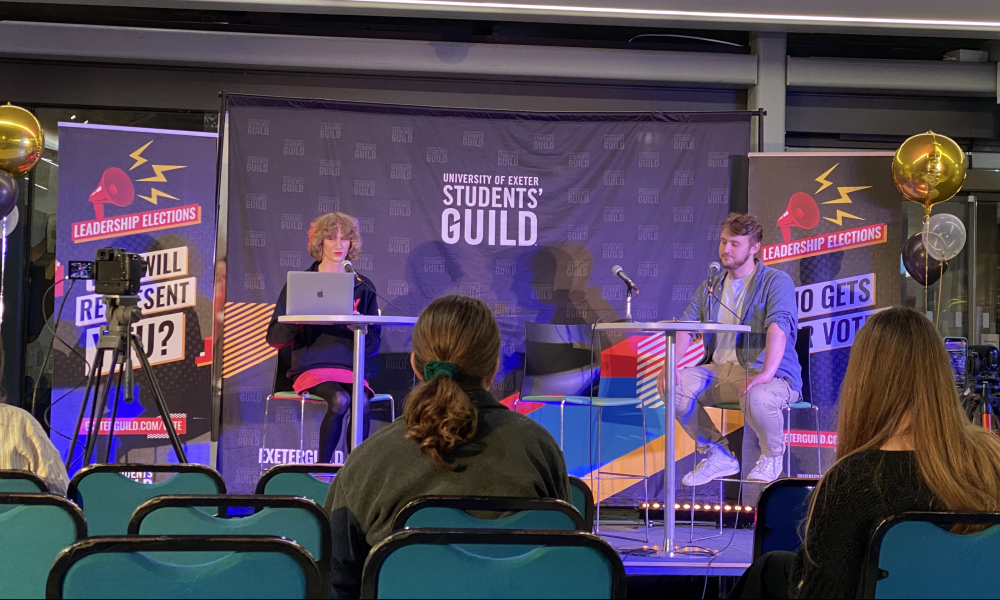Guild Elections 2023: Candidate Question Time

The first Candidate Question Time took place on Monday 20 February, giving students an opportunity to ask candidates running for Societies & Employability Officer, Education Officer and AU President about their campaigns.
Societies and Employability Officer

This year, two candidates are running for the role of Societies and Employability Officer: Rhys Wallis and Honey Bharat Somaya. Somaya was not present during the scheduled part of the debate and was only able to briefly introduce her manifesto after the Education Officer’s question time. Somaya stated that she is running because she would like to see people from different cultures and backgrounds in student leadership positions. She also said that she wished to tackle problems with racism in Guild societies.
Outlining his application, Wallis emphasised how his experience running Xpression FM gave him insight into what running a society involves. Alluding to problems with room bookings and support, Wallis said that “it shouldn’t have to be a full-time job to run a society”, and that he will draw on his experience in societies to prioritise issues raised by students.
In response to a question about how he would deal with student protests sparked by new societies, Wallis argued that he would use the time between the elections and his induction as Officer to consult the student body and listen to their demands about society registration. He also mentioned that the need for 25 students to endorse a new society could lead to some societies can slip under the Guild’s radar. “If societies are protested on a regular basis, then this risks spiralling and bringing the entire society system down a peg,” he explained. A solution to this problem would be to bring students to the front and centre of the society registration system.
Speaking about controversies surrounding external speakers getting invited to society events, Wallis argued that “we’ve all come to university to learn and have our minds broadened by new experiences. External speakers is one of the ways we can do that, particularly through debating or political societies. Bringing polarising speakers is sometimes the nature of a debate, and it is very important we stay on the right line that is drawn between free speech and hate speech”. He also highlighted that we should have more trust in society leaders as “they haven’t got there by chance: they know what they are doing”. In addition, these society leaders are best placed to know what is appropriate for their society. Wallis stated that the Guild could streamline the process of inviting external speakers, but shouldn’t cut any corners while doing so. “This is another one of those problems between the people who make the rules and people who have to abide by them”, he adds.
Touching on the employability aspect of the role, Wallis recognised that an important aspect of university life was to help people to stand out in the job market. As a result, the Career Zone should be available for all students. Wallis aims to look at why certain students might not be able to engage with the Career Zone. “This is going to be another listening exercise”, Wallis said, “where we find students who are having such difficulties and see what we can do to bridge that gap”. Referencing The Complete University Guide, in which the University is ranked 55th for “graduate prospects”, Wallis mentions that this might be improved by having a closer look at the Career Zone’s accessibility, which could involve hosting more events online for those who cannot come onto Streatham campus. Approximately one per cent of students’ tuition fees are spent on the Career Zone, and Wallis said that he would take a closer look at where exactly this money is going.
Wallis also spoke about St Luke’s campus which, despite being the University’s fastest growing campus, has a lack of events being held there: increased cross-campus connectivity is an important part of Wallis’ manifesto. His strategy for the Penryn campus would be to work with the Falmouth Student Union and encourage societies to set up more three-campus challenges.
In response to an audience question, Wallis said that he would support the creation of a board of society leaders that could advise the Guild throughout the academic year.
Finally, Wallis stated that he would put in place more “common sense society policies. People in societies know best how to run them, and we should give society leaders more wiggle room”.
Education Officer

Alex Stanley is running uncontested for the role of Education Officer. His role on the student advisory board – which has involved looking at the University’s education policies – has left him feeling “disappointed”. Stanley explained that he would like to be able to make change happen, as he feels that “[the University] have let us down on education, failed us on mitigation, failed us on academic welfare and failed us on accessibility.”
When asked about the change in self-certification mitigation that happened this year, Stanley emphasised that this was one of his main priorities: “not everyone who deserves mitigation has the evidence for it. For instance, not everyone who struggles with their mental health has a diagnosis. I think this is completely unfair”.
An audience member asked Stanley how he might combat issues around university grade inflation and speculations about degrees that are not seen as employable. For the latter issue, Stanley stated that he was eager to collaborate with the Societies and Employability Officer officer and the Career Zone. Although Stanley said that grade inflation was not a policy he had looked at before, he would consult the trustee and student advisory boards.
The late submission policy, Stanley highlighted, was “incredibly harsh on students”: the current policy means that work is capped at 40 per cent if handed in more than an hour after the deadline. Drawing on the system used by the University of Leeds, Stanley suggested a system in which marks are gradually deducted.
As an NUS delegate, Stanley was questioned about recent antisemitism allegations that have come out about the NUS. He labelled the antisemitism in the NUS as “disgusting, but it has been dealt with very well since”. However, if he is not happy with the way things are handled in the coming year, Stanley spoke about the possibility of a referendum for the University’s disaffiliation.
On the topic of referendums, Stanley expanded on a point in his manifesto which mentions the possibility of there being a referendum of student support of the UCU strikes: “a lot of students would have liked to see a position from the Guild concerning the strikes, whether that was for or against”. Stanley said that he personally supported the UCU strikes, but that “the democratic way of going about things is through a referendum”. The University and Guild recently released a joint statement that aimed to provide students with compensation for the contact hours they have missed due to strikes. Stanley said that he would support compensation “so long as it was paid for by the University and not the Guild”.
Stanley also clarified his policy on “opt-out exams”: “I am not at all saying that I’m anti-exam, but that not everyone is pro-exam. If we look at the current system, for most students it’s a glorified essay. For most students the only difference is the added stress felt in those 24 hours. In a situation like that, I would encourage module convenors to give students the options to do a normal assignment instead”.
AU President
The third question time event of the evening was between the two remaining candidates for the role of Sports President: Gee Burnett and Brianna Cummings, taking questions from an in-person audience, online, and overseen by the moderator Mikhail Shklover.
The event covered a range of topics beginning with the candidates introducing themselves and their relevant experience in sports within the University before answering a series of questions. These were mostly focused on ensuring that every person within the University feels able to participate in sports.
The first question of the night was how each candidate would ensure that all sportswomen feel equally included in sports across the University as well as sportsmen. Gee focused on ensuring that women felt included when participating in mixed-gender sports, while Brianna wanted to see large varsities that include men and women. On the theme of accessibility, both candidates wanted to see more opportunities for disabled sportspersons to take place in sports such as walking netball, as suggested by Gee, while Brianna drew on her experience teaching disabled adults and children alike how to swim to explain how she would see more inclusion for sports within Exeter’s disabled community. Both candidates promised expanded support for mental health within the sporting community. Brianna advocated for more mental health workshops while Gee wanted to ensure that every sportsperson could talk to someone about their mental health if they wished to.
Another key theme around accessibility that the candidates discussed was financial accessibility, particularly amid the cost-of-living crisis. When asked about the continuing issue over membership fees, Brianna promised to listen to students over the cost of sports memberships, especially considering additional costs like stash, while Gee promoted the adoption of termly memberships in line with the termly release of funds from student finance as well as existing annual memberships and promoting the hardship fund. When later asked about how to decrease transport costs for away games, Gee saw promise in hiring minibuses from local companies in Exeter, particularly as the University is selling one of their minibuses this year. Brianna instead wanted to see more money being spent to aid committee members so that existing group transport could be more smoothly arranged.
On a question about seeing that both Athletics Union-affiliated groups and Guild-affiliated groups would have equal access to sporting facilities, Gee pushed for equal access to societies for both Guild and AU-affiliated groups and for improved facilities which could increase capacity. Brianna meanwhile pointed to the responsibilities of the new Sports President to oversee the refurbishment of the Sports Park on the Streatham Campus and promised to ensure that increased capacity would be taken into account if she is elected.
In the closing speeches, Gee promised to bridge the divide between the Athletics Union and the Guild while also pledging to use her influence to see that the Sports Park refurbishment would benefit all students. Brianna instead wanted to see improved relations with well-being services and stressed the importance of improved facilities.


